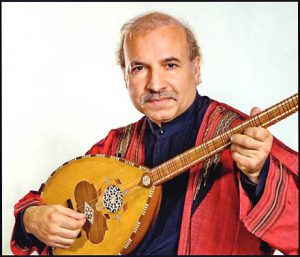
A.J. Racy is a performer, composer, and Professor of Ethnomusicology at the University of California at Los Angeles. Born in Lebanon, Racy is internationally recognized for his extraordinary musicianship and his numerous publications, including his award winning book, Making Music in the Arab World: The Culture and Artistry of Tarab (Cambridge University Press, 2003). He is a master of many traditional instruments, particularly the nay, a reed flute, and the buzuq, a long-necked fretted lute. He has performed extensively in Lebanon and the U.S., including Carnegie Hall, the Kennedy Center, the Hollywood Bowl, and the Walt Disney Concert Hall.
In celebration of McGill’s Institute of Islamic Studies 60th Anniversary, A.J. Racy, the visiting Musician-in-Residence will be on campus from Oct. 9-19, to conduct workshops for McGill students and local musicians and present a public lecture “Art and Ecstasy in Arab Music” at Redpath Hall on Friday, Oct. 12 at 8 p.m. On Friday, Oct. 19 at 8 p.m. Racy will perform with musician Souhail Kaspar, a concert “The Soul Remembers”at Redpath Hall. For more information, click here.
How does it feel to be part of the kick off for the Institute of Islamic Studies’ 60th Year Anniversary celebrations?
I am delighted to be part of the events celebrating the Institute of Islamic Studies’ 60 Year Anniversary. I am also honored to be with so many distinguished participants and guests. The Institute is an ideal place for scholars and artists to meet especially since it recognizes the complexity of the field of Islamic studies and the richness and diversity within the broader Islamic world.
What can participants expect to learn, especially given your extensive musical experience, in the planned workshops?
I am pleased to see music included in the celebration in terms of both scholarship and performance. Indeed, music has played and continues to pay a significant role in the lives of Islamic communities, a fact that may not be obvious to outsiders. The Islamic world has produced numerous treatises on music as a science. Music has been related to therapeutics, the cosmos, and spiritual transcendence. As an ethnomusicologist, I am involved with musical knowledge, the major performance traditions, and the impressive artistry of the Islamic world. Participants from various scholarly backgrounds will hopefully share their own perspectives on the music and other expressive arts.
How do you situate your music within the broader trajectory of Arabic music?
As a Lebanese born artist my performances and compositions are rooted in the musical heritage of the eastern Arab world. The instruments on which I perform and the music I teach are from this region. However, my music also reflects my exposure to other Middle Eastern musical traditions, especially those of Turkey and Iran, which I include in my UCLA doctoral seminars. As a researcher who lives in the large metropolis of Los Angeles, I have incorporated elements from world music into my multilayered profile as an artist.
Can you speak a little bit about the musical selections you have chosen for the upcoming concert at the Redpath Hall?
At the concert, nine musical selections will be presented with brief introductory remarks. Consisting largely of my own compositions, the music will be performed on a number of traditional instruments, including: the nay (reed flute); the buzuq (long-necked fretted lute); the ‘ud (short-necked fretless lute); and the mijwiz (single-reed double pipe). Souhail Kaspar will accompany me on a variety of Near Eastern percussion instruments. The content will feature both precomposed works and improvisations in different melodic modes. The mood will range from the meditative or mystical to the more exuberant or festive.
